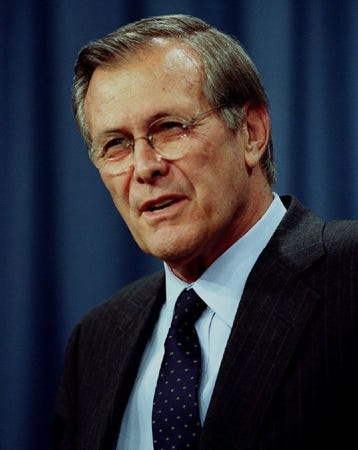
RASHI, RAMBAM and RAMALAMADINGDONG
A Quizbook of Jewish Trivia Facts & Fun

A Quizbook of Jewish Trivia Facts & Fun
Donald Rumsfeld, Secretary of Defense under Presidents Gerald Ford and George W. Bush died last week at the age of 88. Following the September 11 terrorist attacks, Rumsfeld led the planning and execution of the Afghanistan invasion and then the Iraq War which led to the toppling of Saddam Hussein. Rumsfeld was one of the prime advocates for going after Saddam Hussein even though there was no evidence that he had anything to do with the terrrorist attacks. He later referenced his claim that “We know where they [weapons of mass destruction] are. They're in the area around Tikrit and Baghdad” as a misstatement. Rumsfeld was an admirer and strong supporter of Israel and a critic of PLO leader Yasser Arafat, who he felt had not really transformed from a terrorist to a statesman. However, what is one area where Rumsfeld did not support Israel?
rumsfeld_d_h by Cody McComas is licensed under CC BY-SA 2.0
A. A. Rumsfeld strongly opposed Israeli Prime Minister Benjamin Netanyahu’s plan to annex large sections of the West Bank in mid-2020, a plan that was supported by President Donald Trump. Said Rumsfeld, “I recognize that Israel gained the West Bank in a war launched against her by neighboring countries hoping to wipe her off the map. But I also believe that annexation will only complicate U. S. efforts to broaden support among Arab counties against Iran, so I hope annexation plans will not be carried out at this time.”
B. In 1982, Israeli forces invaded Lebanon with a goal of destroying the PLO, whose leadership was centered in Beirut. While Rumsfeld was a strong opponent of the PLO, he did not think Israel’s invasion of the sovereign nation of Lebanon was a wise idea. The PLO ultimately moved their headquarters to Tunisia, where they continued to promote terrorist acts against Israel, while Israel received international criticism after Lebanese Maronite militia supported by Israel carried out the Sabra and Shatila massacre. Rumsfeld wrote in his memoir, “I regret that I was not in government at that time, so that I might have been able to convince Prime Minister Begin not to take these actions in Lebanon.”
C. For many years, Rumsfeld strongly advocated against the release from prison of Jonathan Pollard, who had pled guilty to spying on behalf of Israel in 1986. As early as 1988, Israel began numerous efforts to bring about Pollard’s freedom. Rumsfeld organized a letter in 1998 to President Bill Clinton and signed by six other former secretaries of defense opposing the release, and in 2001 he sent a letter to President George W. Bush urging him not to support the freeing of Pollard. In 2015, Rumsfeld referenced those correspondences when he tweeted “Releasing Pollard was a bad idea in 1998 & 2001. It is not a better idea today.” Pollard, however, was paroled in late 2015, and following the end of his parole period in 2020, he emigrated to Israel.
D. The Israeli government under the leadership of Prime Minister Ariel Sharon proposed in 2003, and implemented in 2005, the unilateral Israeli withdrawal from the Gaza Strip. Many setters left voluntarily, but those who did not were forcibly removed by the Israeli military. United States President George W. Bush supported the Israeli action as a positive step towards peace. But Benjamin Netanyahu, then Minister of Finance, and Natan Sharansky condemned the plan, leading Rumsfeld to say, “I firmly support peace between Israel and its Arab neighbors. But I also believe that Benjamin Netanyahu and Natan Sharansky should be listened to, as they are right that this withdrawal will only lead to more bloodshed.”
E. Rumsfeld read an article in the New York Times Travel section which extolled the state of Israeli cuisine and dining opportunities. He wrote a letter to the editor stating, “You know, when it comes to Israeli cuisine, there are known knowns; there are things we know we know. Like falafel balls. We know they’re delicious. A mechayeh. We also know there are known unknowns; that is to say we know there are some things we do not know. Like what the hell is sabich? Who came up with that? That’s definitely a known unknown. But there are also unknown unknowns—the ones we don't know we don't know. Like ful. Not only do we not know what that is, we don’t even know if it is a real food, or just something someone made up. A completely unknown unknown. I mean, they claim it’s like hummus made with fava beans instead of chickpeas. But why would you do that? Hummus is perfect the way it is. And the only way I like fava beans is with Saddam Hussein’s liver and a nice Chianti.”
✡ ✡ ✡ ✡ ✡ ✡ ✡ ✡ ✡

© 2025 MMJZ Services, Inc.